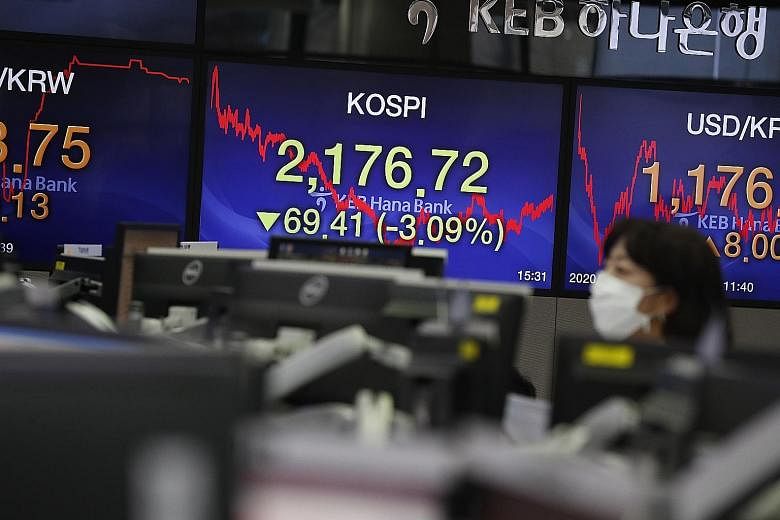Coronavirus fears swept across Asian markets, extending a global sell-off as the disease claimed more lives, sickened people around the world and threatens to derail a fledgling economic recovery.
The first trading day after the Chinese New Year holiday saw Singapore stocks shedding more than 2.9 per cent at one point, before ending at 1.8 per cent lower yesterday.
Japan lost 0.6 per cent, South Korea slipped 3.1 per cent, Malaysia fell 1.35 per cent, while Jakarta and Thailand also closed lower. Earlier, the Dow Jones Industrial Index plunged 1.6 per cent on Monday - its worst showing since October last year. Financial markets in Hong Kong, China and Taiwan remained closed yesterday.
The wildcard is not the fatality rate, but how infectious the Wuhan virus is, and how successfully this outbreak can be contained, Citi Research analysts pointed out. "During the Sars episode, it was not until new cases started to taper off in late April 2003 that the Hang Seng Index found a trough," they said.
A number of Singapore-listed companies that have direct ties with China were heavily sold off yesterday. Sasseur Reit tumbled 10.29 per cent after it announced the temporary closure of four outlet malls in China in response to the virus's spread.
CapitaLand sank 4.88 per cent, Yangzijiang Shipbuilding fell more than 5 per cent, and Wilmar International shed 3.66 per cent. Mapletree North Asia Commercial Trust, which has office properties in Beijing and Shanghai, lost 5.65 per cent.
Gaming plays as well as airlines were also among the casualties, as tourism spending accounts for about 7 per cent of Singapore's gross domestic product (GDP). Genting Singapore fell 3.85 per cent, while Singapore Airlines lost 2.95 per cent.
"A 50 per cent drop in Chinese tourist arrivals could knock up to 3 percentage points off the most vulnerable countries' GDP. The impact will be even greater if the virus deters tourists from other countries," Capital Economics senior Asia economist Gareth Leather said.
Even though the Wuhan virus to date is showing a lower fatality rate than that of Sars, it is still early days. CMC Markets analyst Margaret Yang attributed the equities sell-off to "uncertainty we are facing in terms of economic impact caused by the virus".
"We haven't seen the peak yet. We need to see the turning point before sentiment can improve. Tourism and retail sales will get hammered, not only in China but across South-east Asia. Commercial and retail properties are vulnerable because part of their rental income is from malls, and as the number of tourists drop, their business may be hit," she said.
Maybank Kim Eng economist Chua Hak Bin believes that the virus could take a toll on first-quarter GDP growth in Singapore and other countries that depend on China tourism.
"The direct hit so far is more in China, but a lot of Asian countries are dependent on China tourism and Chinese consumer spending. The question is how fast workers can go back to work as per normal. If the Chinese factories stay shut indefinitely, there could be supply chain disruption. But the critical factories are in the coastal areas like Guangzhou and Shenzhen, not in central areas like Wuhan," said Dr Chua.
"Singapore's GDP growth could be closer to zero in the first quarter if the virus continues to disrupt travel and tourism, and if China's consumer spending slows down further. Tourism receipts account for 6 per cent to 7 per cent of Singapore's GDP, and China is a substantial contributor," he added.












